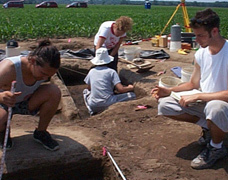
How might howler monkeys help save the Mexican rainforest? What can archeology tell us about the ways Roman conquerors changed ancient Celtic culture? How can digital photography revolutionize perceptions about the border city of El Paso, Texas? Can a college student, free from the distraction of a summer job, write a novel in nine weeks?p. Several talented Notre Dame students set out to find the answers to these and other questions, armed with a healthy dose of intellectual curiosity and grants from the Undergraduate Research Opportunity Program (UROP), a College of Arts and Letters initiative that is administered by its Institute for Scholarship in the Liberal Arts (ISLA).p. Created in 1993, UROP offers two kinds of financial support to undergraduates for independent research and creative projects: Research and materials grants, awarded throughout the academic year, provide up to $1,500 for materials, supplies, travel and other needs. Summer fellowships of up to $3,600 for three months allow students to concentrate on projects without having to hold summer jobs.p. Last year, the winning UROP proposals came from anthropology, art, creative writing, philosophy and sociology. Despite their divergent disciplines, the fellowship recipients share a common quality — a hunger to do the kind of work that takes them beyond the boundaries of the classroom.p. The college gave me what I asked for and more,said Colin Quinn, an anthropology major who was awarded UROP funding to spend last summer on archeological digs in Ireland, Wales and the Isle of Man.I received an incredible experience that would have been impossible if not for this fellowship.p. Quinn’s research revealed new insights about how Christianity influenced traditional Celtic culture. With his advisor, associate professor of anthropology Ian Kuijt, Quinn presented his findings at the 2004 Society of American Archaeology conference in April.p. UROP experiences expose undergraduate students to the entire process of conducting research – from writing the proposal and preparing a budget, to conducting the research and summarizing the findings in a written report or presentation,said Julia Braungart-Rieker, associate dean of research and ISLAs director.Students are free to design an independent project, or propose one that relates to some aspect of a supervising faculty members research.p. Any Arts and Letters undergraduate who is in good academic standing can apply. Neither a specific grade point average nor extensive experience in the chosen field is required – making the awards accessible to a broad group of students.p. UROP funding offers some students an opportunity to journey far from home and immerse themselves in a foreign culture. But for JesusChuyBenitez, a UROP grant gave him the chance to return to a familiar place – his hometown of El Paso – and tell its story through photography. His project exploredthe rich Hispanic culture that continues to exist in El Paso despite the citys struggle with constant immigration from Mexico, poverty, geographic isolation, lack of educational stability in public schools, and harsh weather conditions.p. Benitez, an art major, shot photos all last summer and stayed in e-mail contact with his faculty advisor, associate professor of art Richard Gray. The UROP grant he received also covered the cost of digital photographic and gallery equipment – expenses that can otherwise be prohibitive for young artists.p. The photo project was featured in an exhibit in Riley Hall on campus last winter and eventually will be featured in a gallery in El Paso. The entire experience, says Benitez, has launched his career in photography.p. The greatest benefit of UROP, according to Mark Roche, I.A. OShaughnessy Dean of the College of Arts and Letters,is the enhanced educational experience for so many students, whether they are simply benefiting from the intensive engagement with learning, the development of new intellectual capacities, the close collaboration with faculty members, or whether they may eventually seek scholarship as a vocation.p. More information about the Undergraduate Research Opportunities Program is available at "www.nd.edu/~isla.p.
“:http://www.nd.edu/~isla
TopicID: 5620